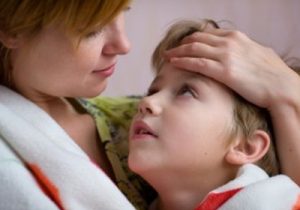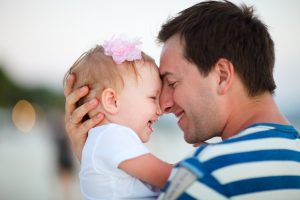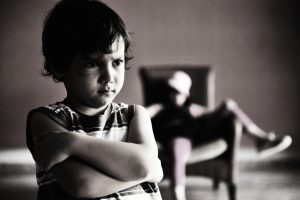Are You the Parent You Want to Be?
 As parents, examples of ways we slip up with our kids occur almost every day. Take a typical scenario of butting heads with your seven-year-old over cleaning his room. At first, you nicely suggest he start tidying up his mess. When he ignores you, you demand, more insistently, that he start picking up his toys. Next, you beg, plea, threaten, negotiate, but nothing does the trick. Before you know it, he is crossing his arms in defiance, and you are at your wit’s end. Finally, you “lose it.” You raise your voice, and yell something to the effect of, “You’re driving me crazy! Just do what I tell you!”
As parents, examples of ways we slip up with our kids occur almost every day. Take a typical scenario of butting heads with your seven-year-old over cleaning his room. At first, you nicely suggest he start tidying up his mess. When he ignores you, you demand, more insistently, that he start picking up his toys. Next, you beg, plea, threaten, negotiate, but nothing does the trick. Before you know it, he is crossing his arms in defiance, and you are at your wit’s end. Finally, you “lose it.” You raise your voice, and yell something to the effect of, “You’re driving me crazy! Just do what I tell you!”
We all have something that triggers us as parents, be it defiance, tantrums, nagging, or whining. When we are triggered, we may not react to our kids appropriately. However, we often don’t realize how much how we are reacting in the present has to do with feelings from our past. How our parents related to us has a heavy influence on how we relate to our kids. Traumatic incidents from our childhood are commonly stirred up when we experience similar scenarios with our own kids. That moment when we “lose it” is often an over-reaction based on feelings that have been awakened within us from our own early life experiences.
In a recent blog, I talked about how letting go of your past can help you become a better parent. The reasons for this are many, but one big reason is that the ways we are hurt as children impact the way we generally relate as adults, particularly to our loved ones and our children. Whether we are reenacting negative patterns or overcompensating for ways we were hurt, we run the risk of projecting our personal experiences onto our kids. When we do this, we often fail to relate to our children as the separate individuals they are. Instead, we might behave in ways that are misattuned to their needs, as our actions have more to do with conditions of our childhood than the current conditions of theirs. So how can we differentiate from these destructive habits?
First, we can ask ourselves how we might be re-enacting our parents’ behaviors. We’ve all had moments when we’ve found words coming out of our mouth like, “Because I said so,” or “Because I’m the boss!” Expressions we heard throughout our childhood, but never thought we’d utter, often slip into our vocabulary when we become parents. On a less apparent level, we may be acting out aspects of our parents’ personality all the time without even realizing it.
Though it seems unnatural, we tend to internalize attitudes that hurt us as children, taking them on as our point of view. We not only apply these attitudes to ourselves, but to our children. If we were seen as a burden by our parents, we may view ourselves as a burden throughout our lives. Because our children come from us, negative ways we see ourselves are often further projected onto them. The critical feelings our parents had toward us are frequently passed on to our kids as well.
An example of this is a mother, who often disapproved of her son’s “wild” personality. She found herself disciplining her son frequently and watching him at all times to make sure he behaved. The second he would start “being silly” or “bouncing off the walls,” she would step in, sending him to his room, forcing extended “time outs,” and giving long, angry lectures on her disappointment with his behavior. In reaction, her son would become even more agitated and less likely to listen to her.
When the woman came to talk to me, I asked her about her own childhood. She described herself as having been quiet and well-behaved, unlike her son. She explained that because her dad was highly temperamental, she and her sister had had to tiptoe around him to avoid his unleashing critical verbal attacks on them. After telling her story, the woman recognized that many of her attitudes toward her son were similar to those she experienced from her father. Although she had aspired to be very different as a parent, in seeing her son as “bad” or “a problem child,” she was treating him as she had been treated.
Reenacting our parents’ negative behaviors is largely an unconscious process, but by getting to know ourselves better and making sense of our own story, we are better able to see how we may be playing out destructive patterns with our kids. Sometimes these patterns are not imitations of our caretakers’ tendencies, but instead, are reactions to how our parents treated us. For example, we may vow never to raise our voice at our child or to always be there for our kids when our own parents were not. These may sound like perfectly healthy goals, but the trouble comes when we overcompensate or distort our behavior based on our own experiences rather than on those of our children who are in a completely different situation. In other words, we may be acting in ways that are inappropriate because they are responsive to our own painful experiences, and this misattunement can have an adverse affect our kids.
For example, a man I worked with grew up feeling deprived and rejected by his parents. The minute he had kids, he decided to be there for them every step of the way. This meant buying them all the toys they desired, carrying signs to every little league game, and filming each activity they enjoyed. To his disappointment, his kids seemed to suffer in several ways from this attention. His daughter, having rarely heard the word “no,” often demanded things without showing appreciation. His son became extremely introverted and resisted his dad’s constant involvement with all of his interests. When this father thought about what was going on, he realized that he was responding to his own past rather than being attuned to the specific needs of his children. His son was experiencing what his dad thought was “support” as pressure, and his daughter was experiencing his “generosity” as entitlement.
When we relate to our children in ways that are reacting rather than acting, we often miss the mark on what they actually need from us. Every person is unique, and our children are not mere replicas of ourselves. By looking at ourselves as autonomous individuals and working on ourselves from that perspective, we do our children a great service. Making sense of our story and differentiating from traits that linger based on our childhood experiences, helps us to become the parents we want to be.
The happier and more differentiated we become in ourselves, the happier and more independent our children will be. Thus, a third step in becoming our best selves in relation to our kids is really thinking about who we are as unique individuals. What are our distinct goals are? What makes us happy and lights us up? What principles do we have in terms of how we want to treat our kids? When we pursue our goals and aim to fulfill ourselves in our lives, we don’t depend on our children to fulfill us or to fix the issues that reside within us. The less pressure and fewer projections we place on to our kids, the more attuned we will be to them. The better able they will be to fulfill their potential as unique individuals, and the better able we will be to nurture them throughout the process.
To read more about differentiation in Dr. Firestone’s latest book, The Self under Siege.
[SlideDeck2 id=15697]
Tags: attunement, differenentiation, good parenting skills, parenting, parenting advice, parenting tips, sibling








Leave a Reply